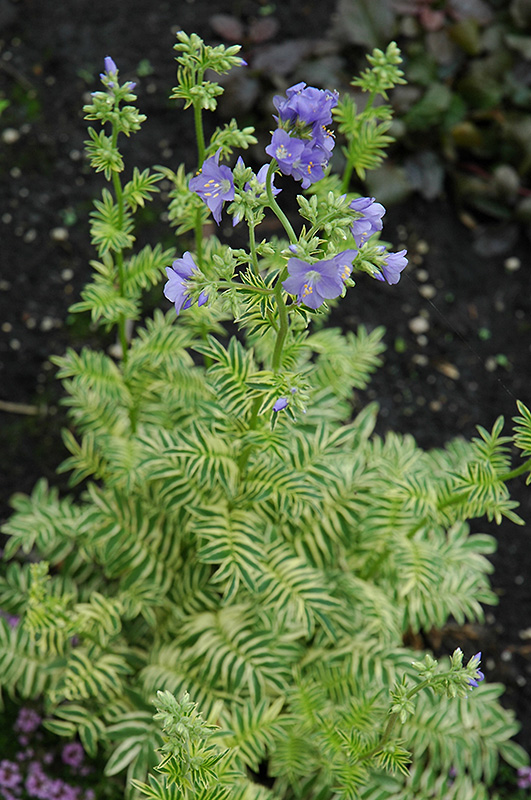Digging deeperPlant Library
Brise D'Anjou Jacob's Ladder
Polemonium caeruleum 'Brise D'Anjou'
Plant Height: 12 inches
Flower Height: 24 inches
Spacing: 15 inches
Sunlight:
![]()
![]()
Hardiness Zone: 4
Ornamental Features
Brise D'Anjou Jacob's Ladder has masses of beautiful spikes of sky blue flowers rising above the foliage from late spring to mid summer, which are most effective when planted in groupings. The flowers are excellent for cutting. Its attractive ferny pinnately compound leaves remain green in color with showy creamy white variegation throughout the season.
Landscape Attributes
Brise D'Anjou Jacob's Ladder is an herbaceous perennial with tall flower stalks held atop a low mound of foliage. Its relatively fine texture sets it apart from other garden plants with less refined foliage.
This is a relatively low maintenance plant, and is best cleaned up in early spring before it resumes active growth for the season. It is a good choice for attracting butterflies to your yard, but is not particularly attractive to deer who tend to leave it alone in favor of tastier treats. It has no significant negative characteristics.
Brise D'Anjou Jacob's Ladder is recommended for the following landscape applications;
- Accent
- Mass Planting
- General Garden Use
Planting & Growing
Brise D'Anjou Jacob's Ladder will grow to be about 12 inches tall at maturity extending to 24 inches tall with the flowers, with a spread of 18 inches. When grown in masses or used as a bedding plant, individual plants should be spaced approximately 15 inches apart. Its foliage tends to remain dense right to the ground, not requiring facer plants in front. It grows at a medium rate, and under ideal conditions can be expected to live for approximately 10 years. As an herbaceous perennial, this plant will usually die back to the crown each winter, and will regrow from the base each spring. Be careful not to disturb the crown in late winter when it may not be readily seen!
This plant does best in partial shade to shade. It does best in average to evenly moist conditions, but will not tolerate standing water. It is not particular as to soil type or pH. It is somewhat tolerant of urban pollution. This is a selected variety of a species not originally from North America. It can be propagated by division; however, as a cultivated variety, be aware that it may be subject to certain restrictions or prohibitions on propagation.
A NetPS Plant Finder tool
This Plant Library is for informational purposes only. We may or may not carry the items listed. During many times of the year, we may carry many more plants in our store than are listed in the Plant Library. Please contact us directly at 303-690-4722 or visit our store for current availability and for assistance.
